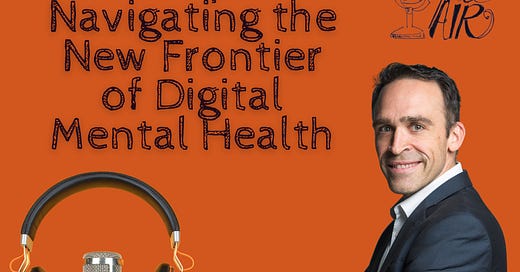In today's episode, we explore the transformative landscape of mental health support in the digital age, where screens dominate our interactions and virtual spaces become our sanctuaries. For a generation raised in the digital realm, seeking comfort and guidance from an AI-powered therapist might not seem far-fetched. This emerging trend raises intriguing questions about the effectiveness, ethics, and implications of integrating artificial intelligence into the realm of psychotherapy.
**Embracing Digital Dilemmas**
We delve into how digital natives instinctively turn to bots for emotional support. Growing up in a world where smartphones are extensions of the self and social media serves as both a lifeline and a stressor, this generation has a unique relationship with technology. Traditional therapy models, with scheduling constraints and face-to-face interactions, may seem outdated compared to the immediacy and accessibility promised by AI therapists.
**Advantages of AI Therapy**
One of the most compelling arguments in favor of AI therapy is its accessibility. In a world where mental health resources are often scarce or stigmatized, an AI therapist offers 24/7 support without judgment or bias. AI algorithms can analyze vast amounts of data to personalize therapy sessions, tailoring interventions to individual needs and preferences. This personalized approach, coupled with the anonymity of digital interactions, can encourage people to seek help earlier and more frequently, ultimately reducing the stigma surrounding mental health issues.
**Unveiling the Drawbacks**
Despite its promises, AI therapy is not without its downsides. Critics argue that the impersonal nature of digital interactions can never fully replicate the depth and nuance of human-to-human connection. Empathy, intuition, and emotional intelligence—qualities that define effective therapy—are challenging to quantify and program into algorithms. Additionally, concerns about privacy and data security are significant, as users may hesitate to disclose sensitive information to a digital entity, regardless of confidentiality assurances.
**Navigating Ethical Dilemmas**
As AI therapists become increasingly sophisticated, ethical considerations come to the forefront. Who is responsible if an AI therapist provides harmful advice? Can algorithms truly be unbiased, or do they merely reflect the inherent biases of their programming? Moreover, the commercialization of AI therapy raises concerns about equity and access: Are these services available only to those who can afford them, thereby widening existing disparities in mental health care?
**The Future of Digital Well-being**
Despite these challenges, integrating AI into mental health care seems inevitable. As technology continues to advance and digital natives become the predominant demographic, the demand for accessible, stigma-free mental health support will only grow. However, it's essential to proceed cautiously, recognizing the limitations of AI while harnessing its potential to complement—rather than replace—human therapists.
**A Real-World Example**
We discuss **Character.AI**, a platform of conversational bots trained to respond like certain characters or professionals. Whether you want to chat with Einstein, Elon Musk, or Harry Potter, over 3.5 million people visit daily, and the #Psychologist bot has received more than 95 million messages since its creation. While not intended as a psychological support platform, it is effectively serving that function for a segment of society. Users report that it "works" and "helps," highlighting the need for careful attention, development, and ethical considerations in these channels.
**Conclusion**
The rise of AI therapists heralds a new era in mental health care—exciting yet filled with complexities. While AI can undoubtedly enhance accessibility and efficiency, it must be implemented ethically and responsibly, paying close attention to the nuances of human psychology. Ultimately, the goal remains the same: to alleviate suffering, foster resilience, and promote holistic well-being in an increasingly digital world. As we navigate this brave new frontier, let's stay vigilant, compassionate, and ever mindful of the human beings behind the screens.
**Join us** as we explore the promises and pitfalls of AI in psychotherapy, discuss real-world applications, and consider what this means for the future of mental health support.
#MentalHealth #AI #DigitalWellbeing #Therapy #Innovation #Ethics #Podcast 🎙️🧠














Share this post